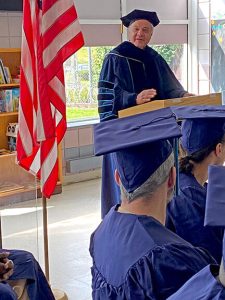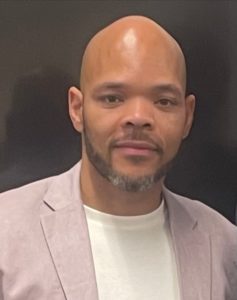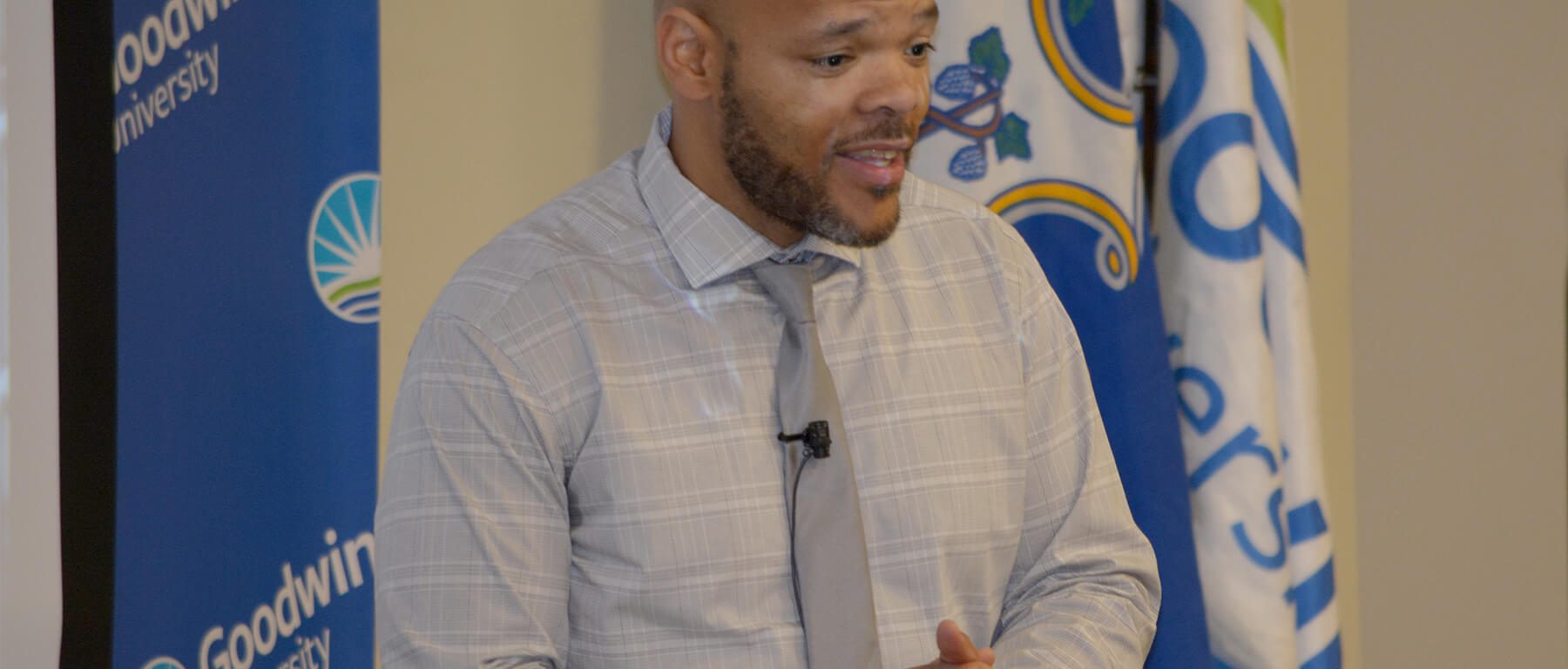From its inception as a business and technology training center through its journey to becoming an accredited university, Goodwin has championed educational equity for nearly 25 years.
On the surface, educational equity is about providing individuals with fair access to engaging, applicable, and appropriate learning experiences. In a more complicated sense, however, educational equity requires instructors to exercise astute cultural awareness — acknowledging the social barriers that affect educational access while addressing their own biases to facilitate meaningful experiences for diverse learners.

From our students and alumni to our faculty and staff, the Goodwin community forms a diverse family of motivated thinkers, doers, and changemakers. We strive to create equitable programs and resources for our students — making accessibility a true pillar of our University culture.
Accessibility and ENet
For Business professor and Entrepreneurial Network (ENet) program director Dr. Matt Connell, MBA, this statement rings with resounding truth — resting at the heart of his work with ENet. “The mission of ENet is to provide an entrepreneurial education to those who’ve been justice-involved,” Connell explains. “We’re focused on trying to provide something that will correlate to financial freedom, career advancement, independence, and generational wealth.”
In his work with ENet, Connell combats outdated ideas about incarceration and justice-involved individuals — a population often overlooked in mainstream conversations about equity and human rights.

Bringing career-ready training and accessible education to justice-involved students is a driving force for Connell. “Besides the connections I’m making with the students, I value playing a little part in providing some type of support for people,” he shares. “But perhaps the thing I value most is teaching super smart individuals who are passionate and committed to their futures.”
Throughout his tenure with ENet, Connell has had many opportunities to meet, teach, and be impacted by passionate changemakers and entrepreneurs. One such student is Gaylord (L.O.R.D.) Salters. An author, publisher, and advocate, L.O.R.D. was recently named New Havener of the Year for his community activism and social justice efforts.
Read on and discover how Salters is using his voice to advocate for the reform of a fractured system.
A life of resilience

Gaylord Salters prefers to go by L.O.R.D. More than a moniker, it’s also an acronym. “It stands for Life Of a Resilient Dude,” he shares.
Growing up in New Haven public housing during the 1980s, resilience was often a strategy for survival. L.O.R.D. and his brother had the vantage point to see violence and injustices unfold throughout their community. In an unpredictable environment complete with gang and drug activity, his family felt the presence of an ever-looming danger. It was easy to find oneself consumed by the traps mothers fought to help their children avoid. But bias was the reality of this broken system and, as two young Black men, L.O.R.D. and his brother found themselves inadvertent targets for prejudicial practices.
The moment of the irrevocable
It was November of 1996 when L.O.R.D.’s path shifted irrevocably. After being implicated in a gang shooting, the New Haven police began pursuing L.O.R.D. as the key suspect. They were willing to get a conviction at any cost — deeming him guilty until proven innocent.
The cost paid for L.O.R.D.’s conviction was the unlawful coercion of a witness. After finding himself threatened with incarceration for carrying an illegal firearm, the witness was offered a dubious out — he would not be charged for possession if he signed a formal statement finger-pointing L.O.R.D. as the perpetrator of the shooting.
For the Salters family, the result of this conspiracy was catastrophic. The court’s ruling resulted in a 40-year sentence, with the possibility of parole only becoming available after 24 years’ time.
“I had to do something, so I started writing.”
For many of us, this would be grounds to give up hope. But even in the face of insurmountable odds, L.O.R.D. remained resilient. Left with two options — to resist his wrongful conviction or quietly relent to the charges — Salters was resolute in his decision to fight for exoneration. Yet opposing his sentence from inside a cell would prove to be a complicated and costly feat.
If Salters wanted to protest the charges, he’d need to acquire the funds necessary to hire lawyers. But for L.O.R.D., the stakes were higher than legal representation alone. By finding a way to turn a profit, Salters could continue supporting his family, whose fate remained uncertain as they anxiously awaited his exoneration. “I didn’t know if I’d come out alive,” he recalls, “and I wanted to garner generational wealth.”
L.O.R.D. had a vision for reclaiming his life. To pursue it, he’d need to ensure his voice would be heard.
“You have to go get it.”
L.O.R.D.’s wrongful incarceration, while circumstantially unique, isn’t an uncommon experience for Black men in America. By offering forth his narrative, Salters realized he could do more than fight his conviction and support his children — he could also expose a stark injustice. “I became passionate about authoring and publishing after being wrongfully convicted,” he explains.
Considering the red tape strewn across the publishing industry, L.O.R.D. determined that to become an author, he would have to think outside the box. “I’m a firm believer in not waiting for anyone to give you what you want in life, regardless of your circumstances,” he describes. “You have to go get it — don’t expect what you want to come to you. Nobody will do for you what you need to do for yourself. In realizing that, I started my company and named it Go Get It Publishing.”
In addition to studying up on the industry, Salters began employing the enthusiastic assistance of his daughter, Gabrielle, who would oversee Go Get It Publishing from the outside. In the face of fierce odds, the pair published three books.
Those incarcerated alongside Salters, as well as the penitentiary guards, found themselves impressed by L.O.R.D.’s achievements. It wasn’t long before he was encouraged to enroll in ENet. “I had stayed away from collegiate opportunities while serving time,” he reflects, “but it seemed like perfect timing. I wanted to sharpen my skills.”
“ENet was like an affirmation.”
Although Salters’ business was well underway, ENet opened new doors — helping L.O.R.D. polish his professional practice and expand his horizons as a publisher. “Programs like ENet are impactful for justice-involved individuals. For me, ENet was like an affirmation,” he recalls. “The classes were helpful, particularly financial education and accounting. The materials were enlightening and answered my questions about things that remained up in the air.”
It wasn’t only the materials that L.O.R.D. found reinforcing, either. “The professors are very hands-on. Even doing it virtually, you could gauge that they’re paying attention to you and your progress,” he shares. “Professors Rotondo and Connell really stood out in the process.”
Salters recounts the significant role played by Professor Michael Rotondo, who helped him introduce Go Get It Publishing to readers worldwide. “I was already thinking about global distribution,” he explains. “I found the right partners and was getting ready to sign the deal, but there was a thirty-page contract with complicated language about accounting and the financial side of things.”
As an ENet student, L.O.R.D. quickly found he had the same access to resources as any other member of the Goodwin community. “I approached Michael Rotondo and asked for his help with the contract,” he reflects. “I explained that there was some content I didn’t understand, and he told me to send it over. Being in a position where you’ve been excluded from the world at large, people showing you compassion like that helps you feel humanized. It affirms that you’re still a person. For me, that really hit hard. This came on the heels of Professor Matt Connell enforcing and reiterating that we all had the same access as any other student. This sent my morale through the roof.”
Reclaiming the narrative
L.O.R.D. wasn’t alone in his incarceration. He shared a cell with his brother, Johnny Johnson, who was also imprisoned on a wrongful conviction. From their isolation, the men often found themselves reflecting on their upbringing. “We spent a lot of time thinking about what our mother went through raising children in an inner city with drugs, violence, and crime,” Salters explains.
Their joint recollection inspired the novel L.O.R.D. holds closest to his heart, Momma Bear, which was first published in 2017. “It’s a work of fiction based on mothers’ experiences and the experiences that take place in inner cities, where moms are trying not to let their kids fall victim to the hospital, the graveyard, or prison.”
Although Momma Bear isn’t autobiographical, L.O.R.D.’s purpose in bringing the book to life was both personal and universal. “Sharing these experiences is absolutely imperative,” he emphasizes. “Society at large doesn’t understand what it’s like for people who’ve gone through these experiences. If you don’t write about or share these experiences, people will never realize.”
Momma Bear was published to an outpouring of positive feedback. But even beyond acclaim, the opportunity to share Momma Bear with the world was its own silver lining during harrowing times. “Being isolated in a cell and not having adequate support to survive is an incredibly dark situation,” he recounts. “The only thing that can trump that is something positive.”
Two returns
As Salters continued opposing his conviction, his brother’s case reached a breakthrough. In addition to being released and exonerated, Johnny was compensated for his wrongful incarceration in a multi-million lawsuit.
Yet the victory of Salters’ brother was ultimately bittersweet. Although the state’s star witness recanted his false testimony about L.O.R.D. in 2018, it wasn’t until 2022 that Salters was released on probation at 47 years old — having served over half of his 40-year sentence. Only months before Salters was released, Johnson passed away unexpectedly. For the Salters family, this meant their long-awaited reunion would never be.
Although he still carries the weight of this loss, L.O.R.D. finds solace by focusing on the big picture. “I try not to get lost in my own wrongful conviction,” he offers. “I focus on doing what needs to be done for the cause.”
Today, Salters isn’t alone in his pursuit of truth. His uphill battle has connected him with other individuals subjected to similar injustices. Together, they seek legal acknowledgement, exoneration, overdue reparations, and much-needed reform.
A county in crisis
New Haven County is home to one-quarter of Connecticut’s population. Yet according to the National Registry of Exonerations, it’s the county where over half the wrongful convictions in the state occur. Many of the most corrupt prosecutorial rulings took place during the 1990s and early 2000s — at the very time when Salters and Johnson were incarcerated.
With community support mounting on his side, L.O.R.D. has kept his feet on the ground while combatting these injustices. After pursuing a legal investigation, he helped bring to light the racist prosecutorial practices that have long plagued New Haven County. He even procured bona fide proof demonstrating that local prosecutors sought to exclude Black jurors from panels.
In acknowledging this bias, Connecticut has launched an initiative called Moving Justice Forward. Although it’s intended to address inequities in the justice system, L.O.R.D. and other members of the New Haven community still find these efforts to fall short. For example, when launching the Moving Justice Forward initiative, the state only incorporated data from four of Connecticut’s judicial districts — excluding New Haven County from the equation, despite its position as a hotspot of wrongful prosecutions.
In response, Salters is taking action. With the support of organizations such as Yale, the NAACP, and the ACLU, he’s pursuing a formal complaint with the Department of Justice. He’s even garnered the guidance and support of Khalilah Ali, Civil Rights Advocate and daughter of legendary boxer Muhammad Ali.
Pursuing truth with proof
This past summer, Salters helped organize a week-long protest, Seven Days of Truth with Proof. Shedding light on systemic racism and injustices, the New Haven rally received daily press coverage from news channels across the state. For Salters, the momentum building behind this movement has been an empowering influence. “It’s been an awesome experience to live through all of this, come out healthy, and be an advocate,” he shares.
L.O.R.D.’s advocacy aims to empower others, too. Favoring the factual over the argumentative, Salters fights fallacy with reason. “I try not to overly focus on the prosecutors because it draws attention away from those who were affected by the decisions they made,” he offers. “Even with the wrongful conviction against me, I feel like I have an army of support. We don’t argue — we present solid facts and represent the people who need relief from a broken system.”
Turning the page
In winter 2023, L.O.R.D. received the honor of being named New Havener of the Year — an accolade attesting to the success of Seven Days of Truth with Proof and his ongoing championship for justice reform, equity, and social progress. “New Havener of the Year is an accolade that I appreciate because it’s a precursor to the change that I’m fighting for,” he reflects.
Honored and humbled by this recognition, Salters charges forth on the promising path awaiting him. In addition to his hopes of bringing an ENet cohort to New Haven, he’s pursuing speaking engagements and expanding the breadth of Go Get It Publishing. “You haven’t seen the beginning yet,” Salters teases. “We’re publishing social justice novels by other authors, as well as more broadly themed works. It’s our mission to continue elevating and uplifting urban communities effectively.”
While momentum builds behind Go Get It Publishing, L.O.R.D. continues to harness his influential voice as an author. With Momma Bear now being read overseas, L.O.R.D. is preparing to publish his next book. Another work of fiction, The Alderman is slated for publication in 2024.
While Salters found invaluable guidance throughout his journey, he remains true to the sentiment on which he founded Go Get It Publishing — an ideology embracing empowerment, advocacy, community, and truth. “I get help,” he reflects. “But at the end of the day, I’ll never be paralyzed by depending on another person to bring the positive forward for me.”
For the latest from L.O.R.D. and Go Get It Publishing, visit gogetitpublishing.com and follow @authorlord on Instagram.

Bri Gagné is a marketing content writer at Goodwin University, bringing backgrounds in literary studies, creative storytelling, Universal Design for Learning (UDL), and social justice. They earned their bachelor’s degree in English Literature and Film Studies from University of Connecticut and a master’s in education from Eastern Connecticut State University.
After teaching English abroad and locally, Bri transitioned to a full-time writing career, contributing to the University’s educational narratives and brand-building efforts. They plan to begin their Master of Fine Arts in creative writing in 2025.

